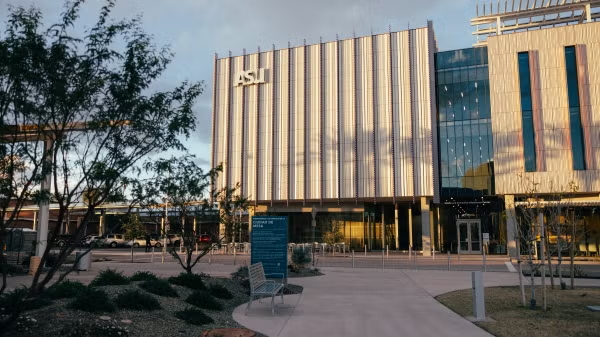American Indian studies graduate, Dean’s Medalist is force of change in her community

Angelique Jose interned for the Attorney General's Office of the Tohono O’odham Nation, where she learned about the justice system and assisted in child welfare cases. As a Native American management intern for Gilbert, she helped plan Native American events. Photo by Meghan Finnerty
Editor’s note: This story is part of a series of profiles of notable spring 2023 graduates.
Angelique Jose's educational journey led her to realize that nothing could match the feeling of helping the Native American community.
Though she originally planned on pursuing philosophy, Jose felt called to explore a path more aligned with her interests. Her advisor suggested taking a few courses, including justice studies.
That is how she found her passion; she is graduating in May with dual degrees in American Indian studies and justice studies.
“It will always be for my community and to serve Indigenous people,” Jose said. “With my career path being justice studies, I feel I can help in many ways.”
The Tucson native interned for the Attorney General's Office of the Tohono O’odham Nation, where she learned about the justice system and assisted in child welfare cases. As a Native American management intern for Gilbert, she helped plan Native American events.
During her education, she developed the desire to continue representing Native American communities in her future career.
Jose represents the American Indian Studies program in The College of Liberal Arts and Sciences as the spring 2023 Dean’s Medalist, a prestigious honor given to only one student in each of The College’s academic units.
She spoke about her academic career.
Question: What’s something you learned at ASU in the classroom or otherwise that surprised you or changed your perspective?
Answer: I was exposed more to the impact of Native American issues. I always heard but never really knew about them to their full extent. Everything in my (American Indian studies) major empowered me to continue to learn more.
Q: Why did you choose ASU?
A: I took a tour in high school, and it felt right. It was not far from home and gave me this room for independence. My dad also came to ASU, so knowing that as well, it was like following in his footsteps.
Q: Which professor taught you the most important lesson while at ASU?
A: I’d say both Bryan Brayboy and Amanda Tachine, who taught a program called Native Narratives. They are both Indigenous, and I looked up to them for sharing their experiences and words of wisdom with me.
Q: What’s the best piece of advice you’d give to those still in school?
A: Pray, pray and talk to whoever you think your creator is. My faith has helped me in my journey, so that would be my first piece of advice, praying for whatever you believe in. Second, create or find your safe space with family and friends or in bed watching Netflix. Find that space, and when you need to take a step back, that space is where you can find yourself again.
Q: What was your favorite spot on campus for studying, meeting friends or just thinking about life?
A: There’s a quiet section in the American Indian Student Support Services center where it was easy for me to focus. That was my safe space because it was quiet, secure and intimate. I could sit down and focus on my work.
Q: What are your plans after graduation?
A: Nothing is set in place yet, but there’s always this responsibility to give back to my Native American community. Over the summer, I had the opportunity to work with the Attorney General's Office in my nation, and there I was exposed to the judicial process. I want to do that for my nation or find a similar position to work for my people.
Q: If someone gave you $40 million to solve one problem on our planet, what would you tackle?
A: It will always be for my community. I want to create a space for mental health in my nation’s community. Native Americans have one of the highest rates of suicide; there are just a lot of things that young Indigenous people go through, and I’d like to be someone who creates that space for them and provides resources for them.
More Arts, humanities and education

Exceeding great expectations in downtown Mesa
Anyone visiting downtown Mesa over the past couple of years has a lot to rave about: The bevy of restaurants, unique local shops…

Upcoming exhibition brings experimental art and more to the West Valley campus
Ask Tra Bouscaren how he got into art and his answer is simple.“Art saved my life when I was 19,” he says. “I was in a…

ASU professor, alum named Yamaha '40 Under 40' outstanding music educators
A music career conference that connects college students with such industry leaders as Timbaland. A K–12 program that…

